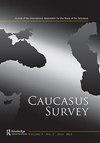The European Union’s Approach to Post-conflict Displacement and “the Local Turn”: A Study on Georgia’s Second-wave Internally Displaced People
IF 0.4
Q3 AREA STUDIES
引用次数: 0
Abstract
Abstract How and to what extent do the European Union’s (EU) presence and projects in Georgia respond to principles and commitments relating to conflict and context sensitivity and local ownership? Drawing on local turns unfolding in both European studies and peace and conflict studies, the article focuses on EU support to Georgian internally displaced persons ( IDP s) and discusses how this is received and perceived by actors on the ground in the context of the EU’s crisis response and the post-conflict setting in Georgia. The discussion is based on data from a questionnaire distributed to 40 respondents in three IDP settlements and by seven interviews with Brussels- and Georgia-based EU officials, as well as local and national authorities, non-governmental organization practitioners, and international organizations implementing EU projects in Georgia. Despite the existence of EU-sponsored measures of assistance targeting Georgian IDP s and the overall positive perception of the EU’s role in large sectors of Georgia’s society, the analysis reveals that the EU does not seem to be fully capable of interacting with local stakeholders and beneficiaries in an effective way. This limits the EU’s ability to uphold the principles of local ownership and conflict sensitivity.欧盟对冲突后流离失所和“地方转向”的态度:格鲁吉亚第二波国内流离失所者的研究
欧盟(EU)在格鲁吉亚的存在和项目如何以及在多大程度上响应与冲突和环境敏感性以及地方所有权相关的原则和承诺?本文以欧洲研究、和平与冲突研究的当地转变为背景,聚焦欧盟对格鲁吉亚国内流离失所者的支持,并讨论欧盟危机应对和格鲁吉亚冲突后环境下,当地行动者如何接受和看待这一支持。本次讨论的数据来自对三个国内流离失所者定居点的40名受访者的问卷调查,以及对布鲁塞尔和格鲁吉亚的欧盟官员、地方和国家当局、非政府组织从业人员以及在格鲁吉亚实施欧盟项目的国际组织的七次访谈。尽管欧盟发起了针对格鲁吉亚境内流离失所者的援助措施,并对欧盟在格鲁吉亚社会的大部分领域所扮演的角色给予了总体积极的看法,但分析显示,欧盟似乎并没有完全有能力以有效的方式与当地利益相关者和受益者互动。这限制了欧盟维护地方所有权和冲突敏感性原则的能力。
本文章由计算机程序翻译,如有差异,请以英文原文为准。
求助全文
约1分钟内获得全文
求助全文
来源期刊

Caucasus Survey
Arts and Humanities-History
CiteScore
1.30
自引率
9.10%
发文量
4
期刊介绍:
Caucasus Survey is a new peer-reviewed, multidisciplinary and independent journal, concerned with the study of the Caucasus – the independent republics of Armenia, Azerbaijan and Georgia, de facto entities in the area and the North Caucasian republics and regions of the Russian Federation. Also covered are issues relating to the Republic of Kalmykia, Crimea, the Cossacks, Nogays, and Caucasian diasporas. Caucasus Survey aims to advance an area studies tradition in the humanities and social sciences about and from the Caucasus, connecting this tradition with core disciplinary concerns in the fields of history, political science, sociology, anthropology, cultural and religious studies, economics, political geography and demography, security, war and peace studies, and social psychology. Research enhancing understanding of the region’s conflicts and relations between the Russian Federation and the Caucasus, internationally and domestically with regard to the North Caucasus, features high in our concerns.
 求助内容:
求助内容: 应助结果提醒方式:
应助结果提醒方式:


